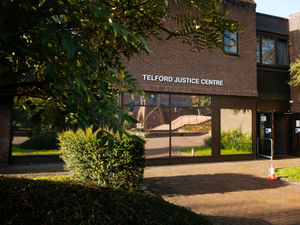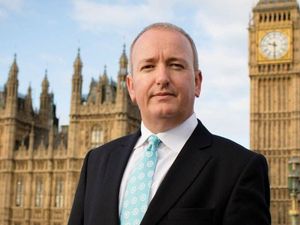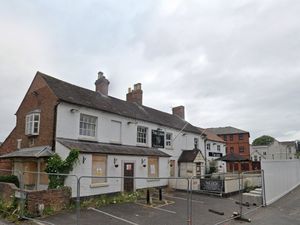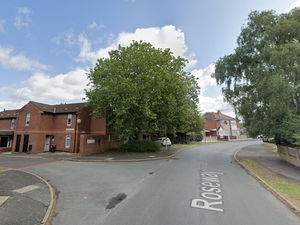The Richie Woodhall collection: My dad taught me to fight
It might be 17 years since he took the World Boxing Council's super-middleweight title, but Richie Woodhall still cuts an imposing figure.
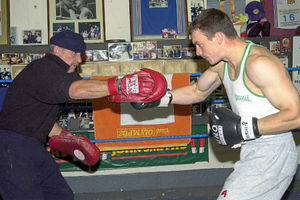
The 47-year-old is in big demand these days as a pundit, and 13 years after his retirement as a professional boxer, there is still something about his stature which commands respect.
Yet when he talks about the influence of his father Len on his boxing career, the guard comes down, and he struggles to hide his emotion.
This toughest of tough guys, the man who took on Thulani 'Sugar Boy' Malinga, Glenn Catley and Vincenzo Nardiello – and won – shows a side to his personality that few people would recognise as he talks about how the illness took its toll on the strong, fit man who was known and respected throughout the sport.
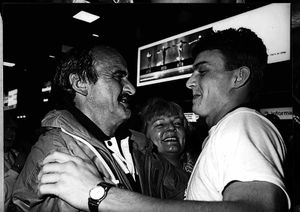
That is why he has decided to sell off some of the boxing memorabilia he has collected over the years, creating a fund that will help cancer charities in Shropshire.
In July this year, Richie's father Len, a retired boxing coach, lost his eight-year battle with cancer, dying peacefully at his home in Telford at the age of 75.
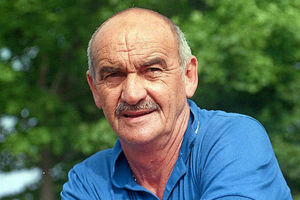
Len Woodhall will always be remembered for the role he played in developing his son Richie, who he guided to the WBC super-middleweight crown in 1998.
But Len, from the Woodside area of Telford, was a mentor for many other boxers too.
He trained more than 65 championship-holding fighters across a career which spanned more than 40 years, and played a major role during the early days of Wellington Boxing Academy, becoming one of its main trainers.
Head coach Mo Fiaz said Len would be sadly missed by everybody at the gym.
"He was there all the time training people and there must be thousands of kids that he has turned into decent boxers over the years," he said.
"He was always very calm and had an affinity for training young people, but we also do keep fit classes and he'd take people of 40 and 50 years old on the pads as well.
"People used to light up when he walked into the gym and, if it wasn't for him, I don't think there would be a Wellington Boxing Academy now."
Mo added: "We have 33 registered boxers and up to 60 people who are training there five days a week now."
Mo said it was Len's paternal guidance which led him to being able carve a fighting career.
"He has been like a father figure to me," he said after Len's death in July.
"I have been with him since I was 15 years old when I started boxing at Madeley.
"He was the coach there and he is responsible for me getting into the sport."
The pinnacle of Richie's career came at Telford Ice Rink 17 years ago when he took the WBC super-middleweight title in a fight against Thulani 'Sugar Boy' Malinga, with Len in the corner.
But Richie says his bronze medal at the 1988 Seoul Olympics was always his father's proudest moment.
Richie went on to take gold at the Commonwealth Games in Auckland two years later, and turned professional after that, losing just three times in 29 fights.
He lost on his first shot at the world title against American Keith Holmes in Washington DC in October 1996, when he tried to fight with a broken hand.
The second disappointment was when he lost his WBC crown in his third defence to German Markus Beyer in Telford in October 1999.
And his third loss was his last fight – against his friend Joe Calzaghe for the world WBO title in Sheffield in December 2000.
And Len was by his side for all of it.
Len last worked the corner in November 2013, supporting now-British welterweight champion Sam Eggington's sole defence of the Midlands crown against Dave Ryan.
Eggington, from Stourbridge, revealed how he visited Len at his home shortly before his death.
"He was unwell but still like his old self, cracking jokes and talking to us about the sport as much as he ever had. He was boxing through and through," he said.
"He was in tears when we got there because he didn't know we were coming as his wife, Anne, had kept it as a surprise.
"He was over the moon.
"He was a good coach and it's a massive loss for boxing.
"He was even better for company. If there's was one person you wanted in the car with you when you were travelling to a show, it was him.
"He'd make you laugh all of the way there. I'd forgotten that I was fighting by the time I arrived."
He said Len had a huge impact on his career when he turned professional, particularly in building up his confidence before a fight.
"If I needed any confidence, he was always the person that I went and talked to," said Eggington.
"He was all about the technical side of the game and knowing your opponent, too, which I think helped make Richie so successful.
"He worked my debut, when I went away to take on an unbeaten kid, and his last time in the corner was when I fought Dave Ryan.
"He was always in my ear, telling me 'you can win this' and keeping me going. He was a good coach and it's a massive loss for boxing."
"A lot of what I have done is down to my dad being a coach," says Richie, who grew up in the Woodside area of Telford.
"I owe so much to both my dad and Harry Grice, who was my main coach from the age of 11 to 19.
"I always remembered throughout my boxing career my dad's influence.
"He always had a feel for the sport as he had boxed as an amateur.
"He always emphasised the importance of using my height and range. I was a tall skinny kid for my weight, and he was always an influence on me using the physical attributes I had."
For more than 40 years, Len was a familiar sight in boxing circles, in his familiar black woolly hat, and had been involved with more than 65 champions, amateur and pro, leading 18 boxers to belts in the paid code.
And as a tribute to the father who he says did so much to shape his career, Richie is planning to auction off a dazzling collection of boxing memorabilia to raise money for cancer charities.
"I wouldn't want anyone to go through what we did as a family," he says.
"It's crippling really, it's been the worst year of my life. But it's given me my enthusiasm and drive to do something in his memory."
Richie was born in Polesworth, Warwickshire, but moved to Woodside at the age of two.
"I've always considered Telford to be my home, and it always will be," he says.
And it was at the community centre in Woodside where he discovered the sport which would make his career.
"I suppose it was the big brother, little brother thing," he says.
"I had two older brothers, Lawrence and Stephen, who were members of Woodside Amateur Boxing Club, and I suppose I wanted to follow in my brothers' footsteps.
"My dad had boxed as an amateur at Birmingham as a kid, and when we moved to Telford in 1971 he became involved with the coaching.
"My brothers went to the club, it was my mother who said to my dad 'you should go along and see if they need a bit of help'.
"I would have been about eight, I suppose, when I first started going.
"We all boxed together at Woodside Community Centre.
"The club was run by Jimmy Maguire, and after a couple of sessions he said to my dad 'do you want to help out?'
"There were a couple of coaches there, and he took his coaching badge, to become an ABA senior coach."
Woodside ABA was renamed Telford ABA following a move to Lumley Hall in Madeley, and it was here that Richie met Harry Grice who became his main coach during his formative years. And he says both men were crucial to his development.
"Harry was a great influence to me, I owe him a lot," he says.
"My dad always worked on my jab, and he always emphasised my need to box at distance.
"Being a top boxer is about using what you have got, and my tool was my range. He taught me that I should keep my distance, I was never going to go toe-to-toe with a short man and fight his fight."
He says Len also taught him about the importance of discipline and self-control, remembering there was more to being a good fighter than simply punching your opponent.
"My beliefs, such as movement and how you work behind the jab, are clear to see," he says.
"The game is all about hitting and not getting hit, so it's as much about defensive skills as attacking. That's very important.
"I think this is the best sport in the world, for getting kids off the street and instilling discipline in them. My dad would certainly have agreed with that."
While the WBC super-middleweight title might have represented the pinnacle of his career, Richie maintains that his bronze medal at the 1988 Olympics in Seoul was always Len's favourite moment.
"My dad always said the proudest moment of his life was when I won bronze at the Olympics, even after I became World Champion.
"I was only 20, and we took an eight-man team.
"Whenever anybody asked him about his favourite boxing memory, he always said it was winning the bronze, more than the world title."
At the games, Richie defeated Desmond Williams, from Sierra Leone, Apolinario Silveira, of Angola, and Rey Rivera, from Puerto Rico, to take bronze. He was defeated by American Roy Jones Junior, who went on to take silver after losing to South Korea's Park Si-Hun in a controversial final.
Among the items Richie is auctioning off is a large print of his 1988 fight against Jones, which has been signed by both boxers.
Len, who had been born in West Bromwich, had been diagnosed with prostate cancer eight years ago, but up until this year had been able to control it with chemotherapy.
"Then at the start of this year, he had pneumonia, and something happened then that triggered the cancer to spread," says Richie.
"It spread to the liver and bones, and that's when they knew there was no way back, and that he had only got so long to live.
"They didn't know how long he had got. They said the fighting spirit of some people mean they can go on for some time, while others can go on for just a few weeks.
"He was in good spirits right until he died. It didn't affect him. He didn't know how long he had, but he had a positive mind. He kept saying 'I'm going to get through this'.
"He didn't suffer. He went to hospital for a bit and they realised there was nothing they could do for him, so they let him go home.
"He was strong. He still wanted to go fishing at the start of the year.
"The local fishing club at Aston Eyre was fantastic. All the fishermen loved my dad and would carry his bait to his peg for him.
"He was getting weak and he couldn't really carry his stuff around so the lads would carry his tackle to his peg.
"He still walked down to Madeley regularly and would go into the bookies. He loved to have a bet here and there. Right up until he died he remained as active as possible.
"For the last eight weeks of his life he was at home and he was in the company of people around him."
Richie says that, while battling the illness, Len received care from the Lingen Davies Cancer Care Centre at Royal Shrewsbury Hospital, and that would be one of the charities he would want the fund to support.
"Everyone that treated my dad was really good to him," he says.
"There are some great people on the Lingen Davies ward, they are obviously very experienced and there is a personal touch there. I have got nothing but praise for the nurses, they treated my family very well.
"They say that a third of people are affected by cancer and it is something we really need to do something about it," he adds. "This is why I am doing this in memory of my dad."

